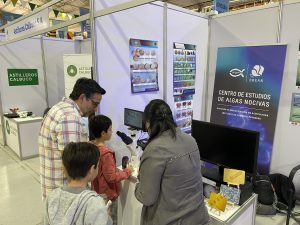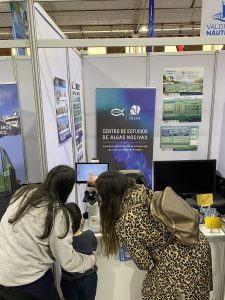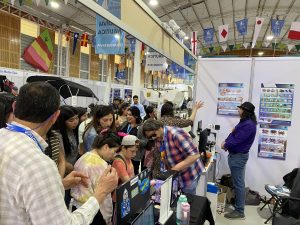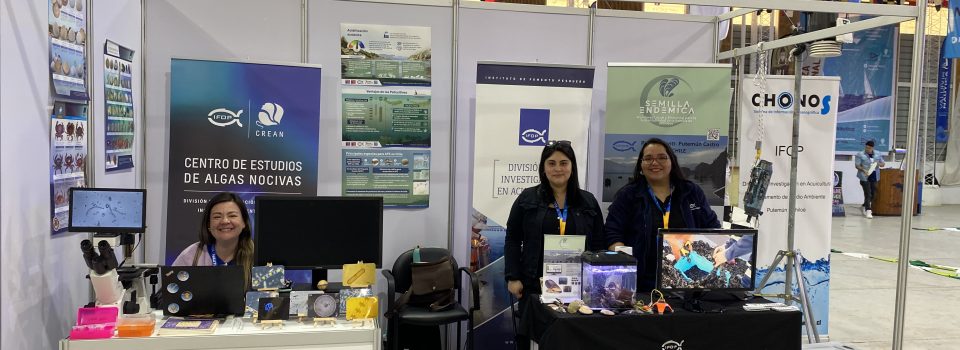Educational, didactic, and entertaining IFOP stand at Valdivia Nautical Fair
November 29th, 2023 Through some Aquaculture Division research groups, Fisheries Development Institute, made known to the community, the extensive work it carries out in various areas such as: Repopulation and Cultivation, mytilids research through its “Endemic Seed” tool, oceanographic studies through its “Chonos” tool, and information delivery on Harmful Algae Blooms with its Monitoring programs, both in the fjord and channel areas, and on the Pacific coast.
Through some Aquaculture Division research groups, Fisheries Development Institute, made known to the community, the extensive work it carries out in various areas such as: Repopulation and Cultivation, mytilids research through its “Endemic Seed” tool, oceanographic studies through its “Chonos” tool, and information delivery on Harmful Algae Blooms with its Monitoring programs, both in the fjord and channel areas, and on the Pacific coast.
 Between November 24th and 26th, Valdivia Nautical Fair’s second version was held in Saval Park of this city. This event seeks to promote nautical industry through strategic intersection between design and boats construction, tourism, sports, technology and companies linked to southern Chile productive development, bringing together hundreds of people every day, who enjoyed the stands and various talks held. Thus, Fisheries Development Institute was invited to participate in this second Náutica Valdivia version, to show public in Los Ríos region and surrounding the important work it carries out in various aquaculture areas.
Between November 24th and 26th, Valdivia Nautical Fair’s second version was held in Saval Park of this city. This event seeks to promote nautical industry through strategic intersection between design and boats construction, tourism, sports, technology and companies linked to southern Chile productive development, bringing together hundreds of people every day, who enjoyed the stands and various talks held. Thus, Fisheries Development Institute was invited to participate in this second Náutica Valdivia version, to show public in Los Ríos region and surrounding the important work it carries out in various aquaculture areas.
The stand was attended by Francisco Cárcamo, Repopulation and Cultivation Department head, who also gave the talk “Contributing to development and sustainability of fishing and aquaculture in Chile”, presenting main´s institutional task, across all departments nationwide. The Mytilid group was represented by Cristian Segura, Cristina Stuardo and José Videla, who captivated children and general public with a saltwater aquarium, explaining through it the main benthic resources, their biological processes, and their “Endemic Seed” tool, which allows for timely information on the variability in the availability of larvae and mytilids for seed collection. Putemún working group was represented by Carolina Medel, who explained to the public the main oceanographic processes, sampling systems, and the “Chonos” tool, which works with an oceanographic information system, whose products and applications are result of environmental studies that, through numerical modeling, seek to improve territory´s management and planning. Finally, red tide group was represented by Rodrigo Martínez and Pamela Carbonell, who showed microalgae various species, talking about their importance in marine ecosystem, and the impact that some harmful species have through production. of toxins related to public health, due to the decrease in oxygen available in water column, or due to mechanical damage that some species produce, thanks to their external structures, in addition to publicizing the monitoring that is carried out in more than 300 stations between the Biobío region to the Magallanes region.
 Without a doubt, IFOP’s participation in “Náutica Valdivia” fair made it possible to publicize various research areas carried out by the Institute throughout the country, in addition to existing tools that each work group has been developing, to contribute to knowledge that allows decision-making in the face of environmental and health contingencies, as well as marveling general public with the diversity of marine life, and understanding how processes are related to each other.
Without a doubt, IFOP’s participation in “Náutica Valdivia” fair made it possible to publicize various research areas carried out by the Institute throughout the country, in addition to existing tools that each work group has been developing, to contribute to knowledge that allows decision-making in the face of environmental and health contingencies, as well as marveling general public with the diversity of marine life, and understanding how processes are related to each other.
